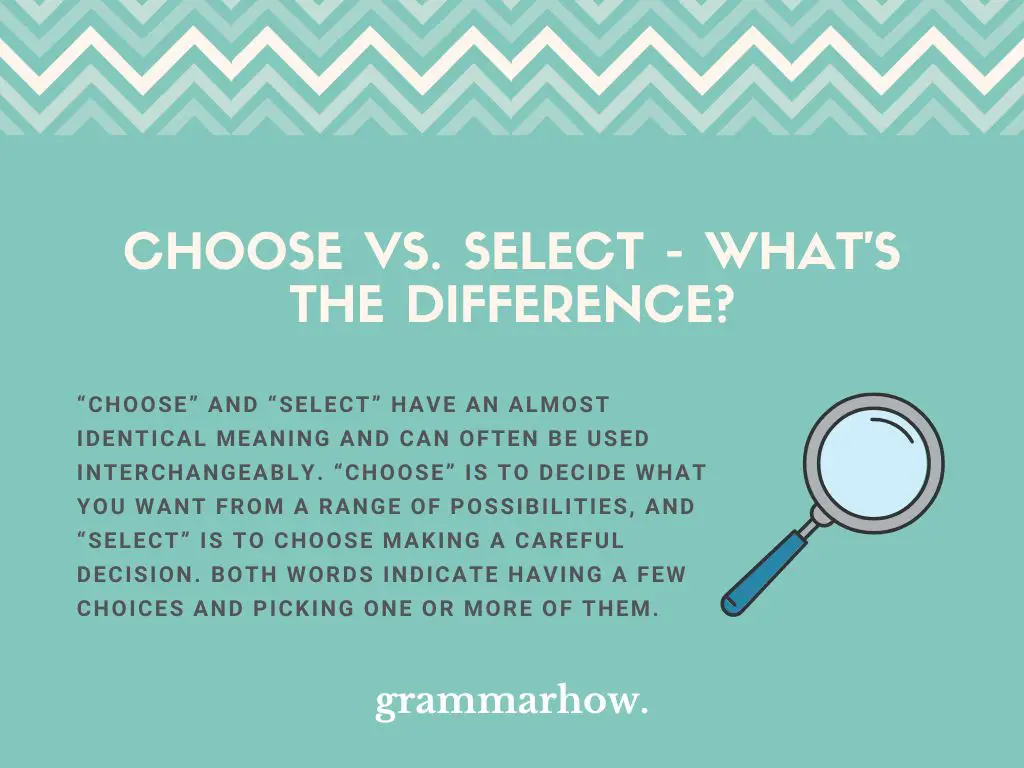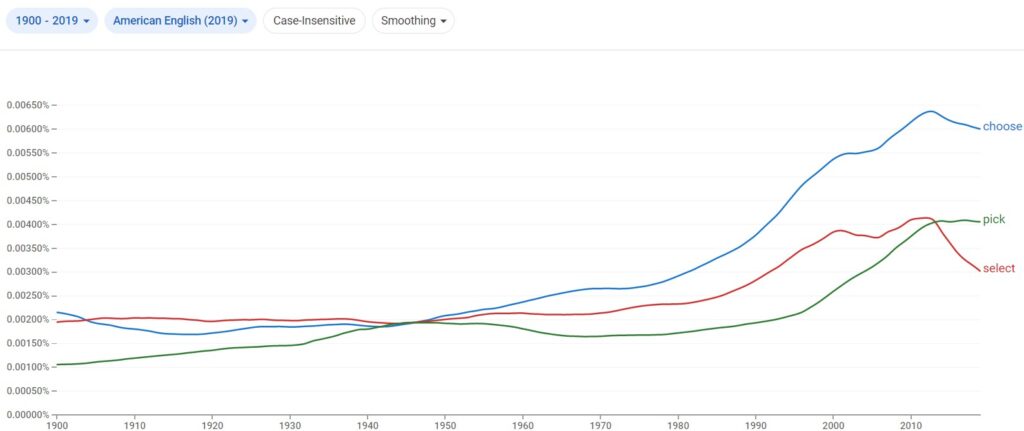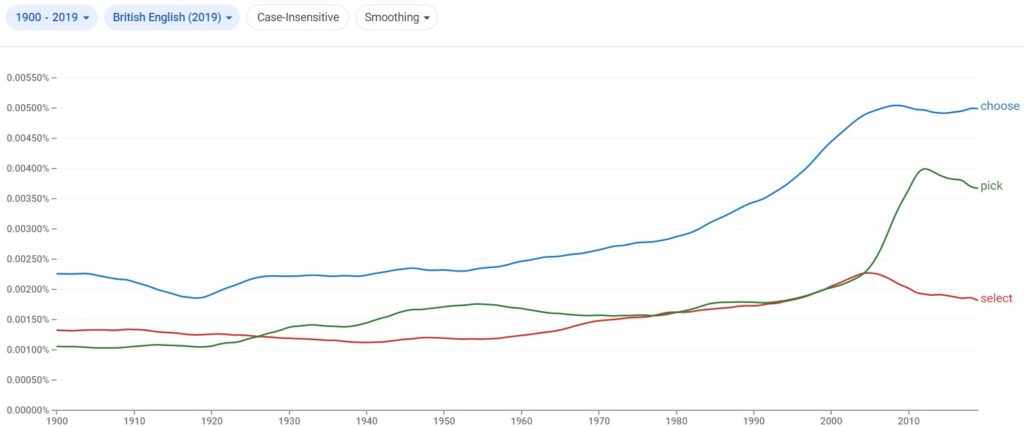When picking an item, do you say “Choose” or “Select”?
For many people, those words are synonyms that can be used interchangeably. But are they really? Also, are they used differently in the UK and the US? If so, we want to know what that difference is.
Choose vs. Select – What’s the Difference?
“Choose” and “Select” have an almost identical meaning and can often be used interchangeably. “Choose” is to decide what you want from a range of possibilities, and “Select” is to choose making a careful decision. Both words indicate having a few choices and picking one or more of them.

Take a look at some examples below:
- At the candy shop, Anne didn’t know what to choose.
- At the candy shop, Anne didn’t know what to select.
As you can see from the two sentences in the example, regardless of which word you pick, both “Choose” and “Select” convey the same message. Let’s take a look at each word separately, to try and catch their nuances.
Choose
To “Choose” is to make a choice from a range of options. When someone “Chooses” they’re making a decision as to what they want to have or what they want to do.
In fact, The Cambridge Dictionary reinforces the idea that “Choose” relates to actions and life decisions, as much as it relates to picking an option from a set, or a list.
Let’s see some examples:
- So, which flavor did you choose?
- Sarah hated having to choose between people.
- Aaliyah was chosen to be the team captain.
- I don’t know which shirt to choose today.
- Paul chose to skip class today.
To “Choose” quite often involves making decisions on rhetorical things, such as skipping class or picking a favorite person, as much as it relates to small things like picking a flavor or what to wear.
In that sense, “Choice” is a word that has a broader use, when compared to “Select”. Let’s take a look at “Select” now, to try and understand that difference a little better.
Select
To “Select” to choose a number of things, by a process of making a careful decision. A “Selection” is often a small set of the best in their group, so being “Selected” can be considered an honor or distinction.
The definition The Cambridge Dictionary makes is clear that “Select” is usually used for tangible, or physical things, and not rhetorical conversations (like “Choice” would).
- What color did you select?
- Make sure you’re confident about your selection.
- Henry selected the third option.
- What’s the criteria for selection into the program?
- She used the computer mouse to make her selection.
- Paul selected to skip class today. (incorrect)
As you can see from the examples, “Select” involves tangible choices and not life decisions. Sentence 6, for example, replicates the same content in one of our examples for “Choice” – and “Select” in that context, doesn’t work.
You’d never say that “Paul selected to skip class”, because that’s not really a selection from a tangible set of options. Skipping class is a life’s “Choice”.
Pick
To “Pick” is literally to take some things and leave others. For example, if you had a box of candies in front of you, you’d “Pick” some to have and leave the ones you don’t want in the box.
The Cambridge Dictionary agrees with this idea of taking and leaving items from a selection of choices.
Let’s take a look at some examples:
- I don’t think you should pick that one, because it looks smaller than the others.
- Peter says we should pick blue to be the team color, but Anthony prefers yellow.
- What material should I pick to build a dollhouse?
- If you can’t choose, just pick out one at random.
- Randy was picked as one of the winners of the contest.
“Pick” and “Select” are interchageable. If you change the word “Pick” in the examples above for “Select”, all of the sentences would still work and convey the same message.
The slight difference is in the word “Choice” that works so well for rhetorical choices, when the other two sometimes don’t. You should try and be careful when interchanging “Choice” for “Pick” or “Select”, just to make sure that change won’t affect the meaning of your sentence.
Choose or Select or Pick In the US?
Sometimes, English speaking habits are different in the US and the UK. If we looked at the US alone, which of those three words is used more often? Let’s find out by looking at the graph from Google Ngram Viewer below.

The graph reflects the American English use of “Choice”, “Select” and “Pick”.
In the US, “Choice” is the word used more often. That’s not surprising, given that “Choice” has a broader meaning and use.
In second place, there’s “Pick”. However, if you look closely, you’ll see that not long ago (in fact, about a decade ago) “Select” was used more than “Pick”, which indicates a recent trend that may or may not be confirmed.
Choose or Select or Pick In the UK?
How about the UK? For people who speak British English, which of the works is more common, “Choice”, “Select” or “Pick”? Take a look at the graph from Google Ngram Viewer below to find out.

The UK follows that same trend as the US. “Choice” is first in appearances, “Pick” comes second, and “Select” is in third place.
However, the change in use between “Pick” and “Select” came a little earlier in the UK. “Pick” became more common than “Select” around the mid 2000’s. Also the difference between those two words is more significant than the one we see in the US graph.
Final Thoughts
“Choice”, “Select” and “Pick” are correct and have similar meanings. However, use “Select” and “Pick” for physical, tangible choices – such as an item in a list, for example. Use “Choice” for those things, but also rhetorical “Choices”, such as what you want to do with your life, for example.
You may also like:
Choose From or Choose Among – Which Is Correct? (+Examples)
Unselect or Deselect – Which Is Correct? (Helpful Examples)

Martin holds a Master’s degree in Finance and International Business. He has six years of experience in professional communication with clients, executives, and colleagues. Furthermore, he has teaching experience from Aarhus University. Martin has been featured as an expert in communication and teaching on Forbes and Shopify. Read more about Martin here.
